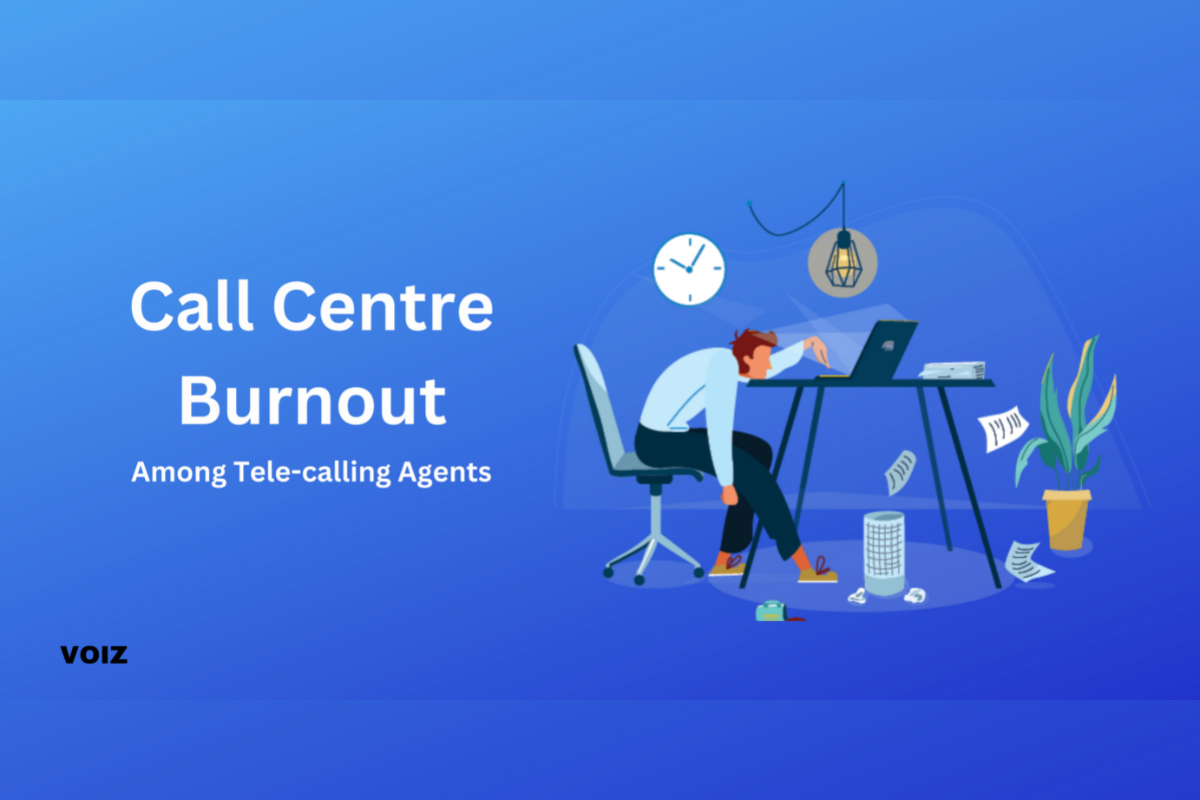In general, Call Centre Burnout occurs among the Tele-Calling agents who are under extreme pressure. They are under a lot of pressure to achieve organisational goals. Operations’ constant pressure to outperform the metrics, puts them under tremendous pressure. Managers monitor these agents’ services. These dynamics drive the symptoms of depression and cause call centre burnout.
What is Call Center Burnout?
Call Center burnout happens when Tele-calling agents are under chronic stress due to imprecise expectations, an imbalance in work and life, and other improperly managed conditions on the floor.
World Health Organisation (WHO) officially recognised Burnout in 2019. It is categorised as a syndrome with three main characteristics:
- Feelings of weariness and lack of energy,
- Reduction in Professional efficacy,
- Intensified mental distance or feeling of negativism toward the job.
Persistent stress and Post Traumatic-Stress Disorders (PTSD) tele-calling can cause health issues such as contact centre sadness and anxiety and even lead to physical symptoms. Call Centre burnout is quite common among tele-calling agents. Their service line demands a heavy emotional-labour and keeping upbeat with the contact centre’s fast-paced – results-driven work, can be difficult.
Fortunately, managers can help agents overcome call centre burnout and decrease its effects as much as possible.
6 Effects of Stress on Tele-Calling Agents:
The negative repercussions of agents’ stress have an unfavourable influence on the company and its profitability.
There are some consequences of stress on call centre agents, Such as:
1. Poor Health:
More stress causes more frequent and severe illness and Longer recovery times, panic attacks, headaches, stomach trouble, and Back-discomforts.
There is also evidence that 30 to 40 per cent of call centre agents have eye strain, impaired vision, light sensitivity, headaches, depression symptoms and other problems.
2. Inefficient Performance:
Stress lowers an agent’s capacity to work efficiently. Instead, it redirects the energy away from work-related activities and stress management. All these situations lead to call centre agents being less satisfied with their jobs and finally lower profitability for the employers.
3. Conflict at Work:
Stressed call centre agents are more likely to have workplace conflicts with coworkers and managers.
Increased absenteeism, reduces performance and productivity, and less organisational profitability are outcomes of conflicts.
4. Emotional Exhaustion:
Stressful events diminish the emotional resources required to cope with work, leaving agents exhausted.
Call Centre burnout is characterised by emotional or physical tiredness and a loss of personal identity.
5. Absenteeism
Absenteeism is a regular absence from work and is frequently done on purpose and for no good reason. The factors like burnout, family problems, workplace harassment, sickness, and job hunting can lead to Absenteeism.
Absenteeism may result in increased costs for employees.
6. Higher Turnover Rate:
Agents under higher stress at work are less satisfied with their workplace and are more likely to leave.
According to one study, contact centres had a 40% turnover of agents leaving because of stress-related causes.
Reasons why VOIZ’s agents Never Face Call Centre Burnout?
Unfair treatment, Lack of clarity, Lack of communication, and Slight time pressure cause call centre depression and burnout at work. The followings are the top six ways VOIZ overcome Call Centre Burnout.
1. Recognised Depression Symptoms in Employees:
It takes a sharp eye and a little empathy to see when staff are burning out. Managers at VOIZ help their direct subordinates overcome their issues of burnout.
Managers at VOIZ through micromanagement give reasonable targets and also provide training on par with the industry standards, which helps agents ready for any challenging circumstances
2. Provide Support:
Tracking the employee experience, that is, breaks, schedule, time off and tracking daily KPIs, can create a climate in which good employees feel underappreciated. VOIZ’s Work from Home Culture evades all such discomforts to agents, making it an ideal platform for agents to work.
3. Address Unfair Treatment:
It is beneficial for staff satisfaction and productivity. It’s a difficult task, but skilled leaders at VOIZ make a difference.
Empathy as a company goal is a great place to start, but it can go beyond the control of a Tele-callers manager.
4. Clarify Roles:
Unclear job role are frequently blamed for workplace stress. Agents at VOIZ ensure leadership satisfaction, improved productivity, and remain on equal and better role clarity. This cycle is one strategy for resolving a lack of position definition using continual input.
5. Sort-Out Unmanageable Workloads:
If the agents’ workload is becoming too much to handle, VOIZ considers it by distributing the workload among other agents and making sure the agents feel less burdened.
All the lead assignments are automated via online software tools which are programmed in such a way that agents never get overburdened. These tools are VOIZ’s proprietary.
6. Use Better Technologies:
The call centre software solutions that prevent agents’ collaboration, display irrelevant metrics, or fail to include relevant customer information along with call data can lead to frustration agents experience.
The technical team at VOIZ after thorough research and development of the tool has eliminated all the irrelevant, redundant procedures, however, agents are allowed to take enough time for all post-call updation like the call tracking information for follow-ups and other needed information such as the call disposition etc… Agents feel less stressed because the User Interface of the software is intuitive and self-guiding.
Final Thoughts:
Call Centre Burnout is a Disorder, many Tele-calling agents face due to many factors like work pressure, peer pressure and other forms of chronic stress. Call Centre Burnout results in high rates of absenteeism and work burnout. Tele-calling managers at VOIZ recognise depression symptoms and take all the precautionary measures to overcome Call Center Depression and Call Centre Burnout among the agents.
VOIZ’s Work-from-home culture has shown tremendous improvements in the Gig-workforces. WFH culture leverages agents to all the comforts of home and still be involved in the tele-calling job. VOIZ helps these agents to balance work and life equally well.

